.
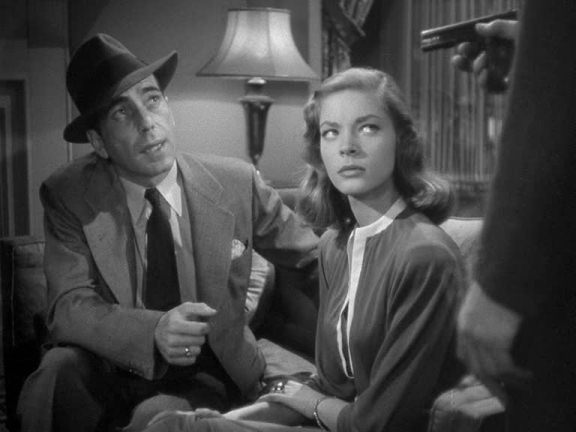
.
Director: Howard Hawks
By Roderick Heath
“But down these mean streets a man must go who is not himself mean, who is neither tarnished nor afraid. The detective in this kind of story must be such a man. He is the hero; he is everything. He must be a complete man and a common man and yet an unusual man.” – Raymond Chandler, “The Simple Art of Murder”
Raymond Chandler, a former oil company executive who had found himself jobless in his forties, turned to writing crime fiction for survival and to expel the cynical passion that had built up inside him. Inspired by the genre’s early master, Dashiell Hammett, who had already lapsed as a novelist, Chandler began writing short detective stories before achieving a smash with his first novel, The Big Sleep. Where Hammett’s diamond-hard prose and stringent sense of human motive blended a peculiarly Dickensian imagination with a hard-earned understanding of street realities, and Chandler’s rivals like James M. Cain and Jim Thompson were paring down their words to hard blocks of chilly analysis, Chandler brought intricate, even florid, visual and experiential prose as well as literary awareness to the form. He turned the private eye tale into a type of neomythology. Chandler’s singular hero, Philip Marlowe, became his tarnished knight-errant, anatomising a corrupt society whilst retaining his decency under a veneer of cool scorn and world-weary alienation.
.
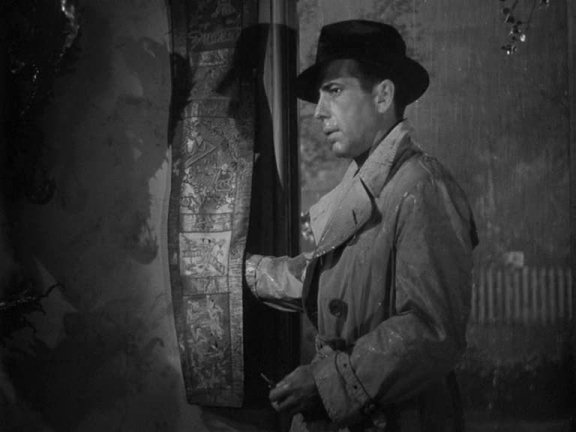
.
Chandler’s writing was inimitable on the page but he swiftly inspired a raft of strong cinema. The first film based on his work was Murder, My Sweet (1944), taken from his second novel Farewell, My Lovely, and cleverly cast Dick Powell as Marlowe, his boyish face from his ingenue days turned anxious and leathery and thus a good mix for embodying Marlowe’s peculiar persona. Robert Altman’s The Long Goodbye (1973), greeted as shambling revisionism in its time, actually got to the heart of Chandler’s often outmatched, fool-of-fortune hero to a striking degree. Dick Richards’ more traditional Farewell, My Lovely (1974) cast Robert Mitchum as a tough, aging man tormented by his own failures. But the best known and arguably most perfectly iconic Marlowe, however, was Humphrey Bogart, who played the role for Howard Hawks in The Big Sleep.
.
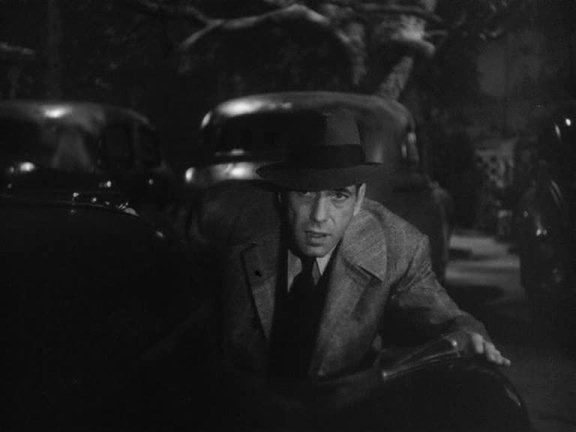
.
Playing private eyes, gangsters, and other urban warriors was already second nature for Bogart, who had finally cemented his film stardom by playing Hammett’s distinctly grubby Sam Spade in The Maltese Falcon (1941). Bogart was an unlikely figure for such roles, as he came from a blue-blood New York clan, but youthful experiences in World War I, where according to lore he received a facial injury that gave him his signature lisp, and a spell of rank poverty during the Depression chiselled worldly knowledge deep into Bogart’s face and voice. He became American cinema’s image of the tough, savvy man of action until his death from cancer in 1956. The Marlowe Bogart plays in The Big Sleep isn’t quite the sad-sack he increasingly became in Chandler’s books, but a swift-tongued, poised, occasionally insolent swashbuckler with a moral streak that never feels forced, but rather flows from his refusal to be bullshitted.
.
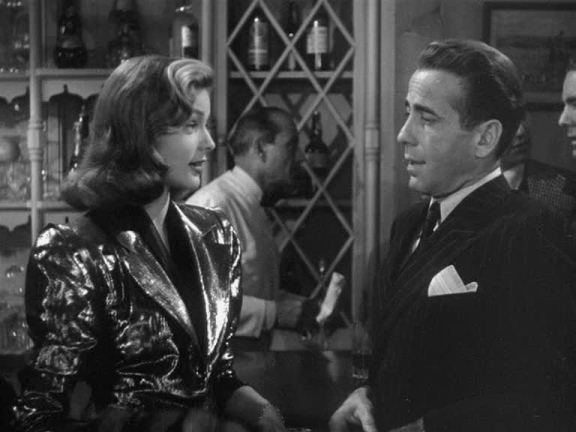
.
Hawks made The Big Sleep as a follow-up to his and Bogart’s first collaboration, To Have and Have Not (1944), which had made a star out of model Lauren Bacall. Bacall and Bogart’s on-screen chemistry lit up the screen, whilst their off-screen affair was common knowledge and ended Bogart’s troubled second marriage. Hawks and his formidable task force of screenwriters, including future Nobel Prize winner William Faulkner, sought to create another vehicle for the couple’s electric appeal. They seized on Chandler’s work, even though they couldn’t work out who killed whom at one point, and soon found the author couldn’t remember either.
.
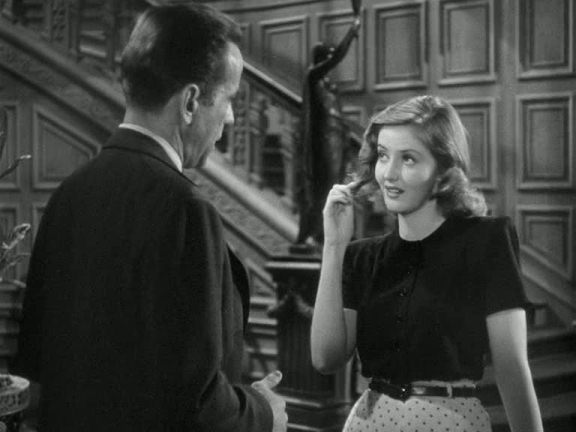
.
Of course, The Big Sleep, although a mystery and a crime drama, isn’t really about its plot. Its connective tissue is provided by entwined incidents of romance and evil, rather than riddle. Narrative velocity is provided as Marlowe sinks up to his neck in the proliferating consequences of the perversities of a family of American aristocrats, who have turned the national dream into an id-inflected nightmare purely by dint of self-indulgence. The animating mood of Chandler’s novels, captured beautifully in this film in spite of its buoyant segues, is one of miasmic corruption and evil welling out of a still-callow, urban America that’s infected with secret appetites fed by feudal princes of the underworld, creating a noxious symbiosis that can only be battled by someone who understands it intimately. Bogart, who had found his real break in cinema playing hood-eyed heels ready to break teeth and plug bellies, was ideal to play such an intimately conversant hero, hard knocks and rude facts impressed upon his persona. Marlowe’s first appearance in the Sternwood Mansion sees him immediately fascinated by effetely competent butler Norris (Charles D. Brown), and the thumb-sucking teenaged seductress Carmen Sternwood (Martha Vickers), who, as Marlowe puts it, tries to sit in his lap whilst he’s standing up.
.
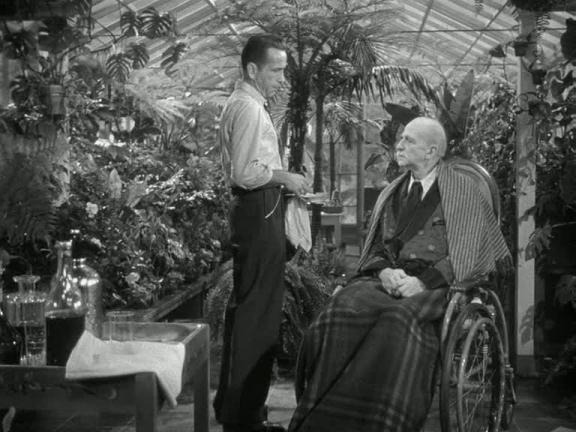
.
Marlowe is hired by Carmen’s decrepit, wheelchair-bound but still whip-sharp father General Sternwood (Charles Waldron) to find the most sensible way to get rid of a blackmailer who’s calling in Carmen’s gambling debts. Marlowe’s interaction with Sternwood is a marvellous introduction to the strange adventure upon which he’s about to embark, the General mentioning that he imagines his daughters “have all the usual vices besides those they’ve invented for themselves,” and coolly notes, “If I sound a bit sinister as a parent Mr. Marlowe, it’s because my hold on life is too slight to include any Victorian hypocrisy.”
.
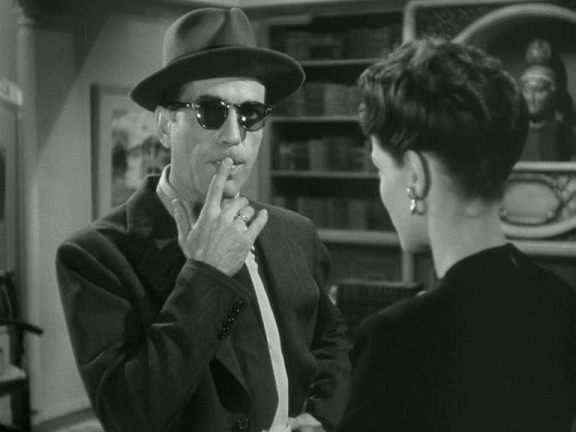
.
Sternwood is quietly pained by his recent abandonment by personal bodyguard and companion Sean Regan, who usually took care of such unpleasant business for Marlowe. Marlowe soon realises that Regan’s disappearance is on the minds of others, as Carmen’s older sister Vivian (Bacall) tries to find if he’s been hired to find Regan. Marlowe rebuffs her in a verbal skirmish of quips, insults, and innuendo, and then gets busy tracking the apparent blackmailer, Arthur Gwynn Geiger (Theodore von Eltz) to a rare bookstore he owns. There, Marlowe pretends to be a camp dilettante, annoying Geiger’s chicly dressed, but covertly brassy shopgirl Agnes (Sonia Darrin) and noting the apparently forbidden trade of the shop. Marlowe consults an employee in a neighbouring shop (Dorothy Malone) who is able to point out Geiger to him. Marlowe follows Geiger to his house and whilst staking the place out hears multiple shots, followed by two cars fleeing. He finds Geiger dead and a very high Carmen sitting by the body.
.
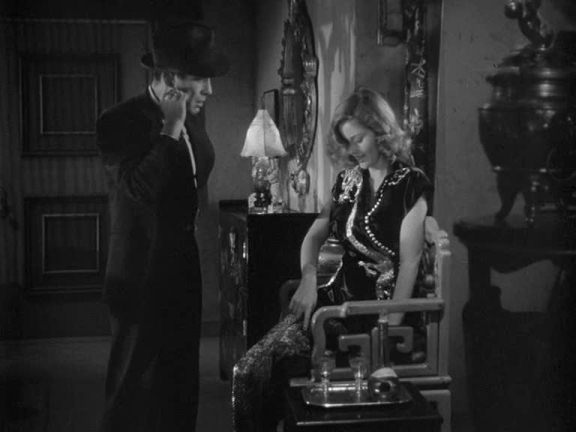
.
The most difficult challenge for Hawks and crew wasn’t Chandler’s knotty plot, but rather the litany of crimes, depravities, and illicit acts encompassed by the story, nigh impossible to portray under the rules of the Production Code. Carmen’s drug addiction, Geiger’s pornography racket that has her in thrall, Geiger’s gay relationship with his gunsel Carol Lundgren (Tommy Rafferty), and sundry other aspects had to be conveyed via nudge-and-wink devices, like Marlowe glimpsing a flustered-looking man looking for access to the locked back room in Geiger’s store’s, or Marlowe recoiling when he sniffs a concoction near Carmen in Geiger’s house, the girl not stark naked as she is on the page, but draped in a Chinese bathrobe. Major story developments had to be changed, too. Regan could no longer be Vivian’s husband as he was in the book, just as the identity of his killer had to be carefully smudged. Yet The Big Sleep still conveys an atmosphere of impeccable sleaze, as the dialogue and action constantly trace the sordid world it sees lurking behind urban brickwork, suburban rose bushes, and brownstone mansions alike. Hawks and company even make an overt joke out of the barely censored material when he has Agnes repeatedly cut off from finishing her angry description of a hood pal as “a pain in my—”. The Big Sleep conveys a pervasive relish of the dark side of American life that makes it stand apart from a lot of the noir films that would follow it, feeling closer in spirit to the boastful, struttin’ blues of guys like Muddy Waters and, much later, many a hip-hop star.
.
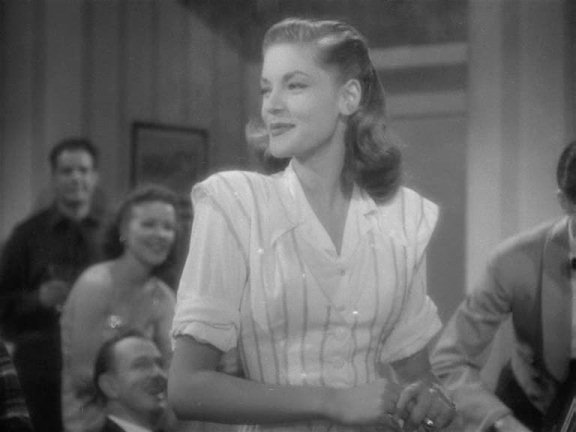
.
Like those artists, The Big Sleep simultaneously brags and conspires with the audience to delight in its carnality and brutality in a manner partly detached from the oncoming noir pattern of stark moral parable. Toughness, terseness, cool under pressure, a capacity to look at the meaner things in life and love and still sling off a devastating wisecrack: not only does the film revolve around such traits, but positively fetishizes them. Sometimes it does this to a grimly hilarious extent, like the traditionally shoehorned time-out for a song, where Bacall warbles lyrics bouncily reporting the tale of a “sweet, sweet guy” who socks his lady in the choppers.
.
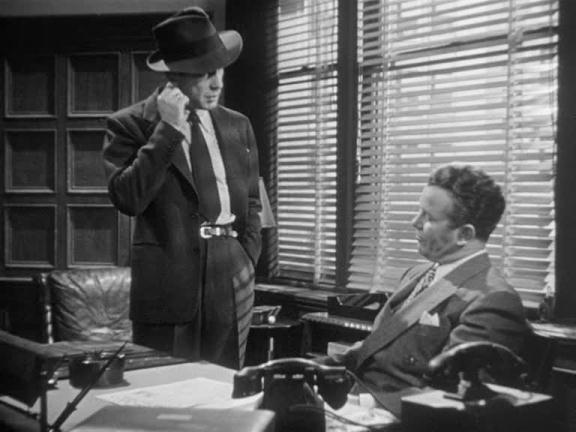
.
The specific appeal of the private eye genre has always been about the detective’s independence from the state-sponsored moral force represented by the police. Marlowe’s breezy confidence in sticky situations is quickly confirmed, as he spirits Carmen from Geiger’s house, tells Norris and Vivian how to handle the situation, and then returns to study the crime scene and work out what happened. A police inspector pal of Marlowe’s, Bernie Ohls (Regis Toomey), calls him out to a seaside pier, where a car containing the Sternwoods’ murdered chauffeur Owen Taylor has crashed into the water. Ohls, who recommended Marlowe for his current job, half-jokingly suggests Marlowe might have rid the family of a problem by killing Taylor.
.
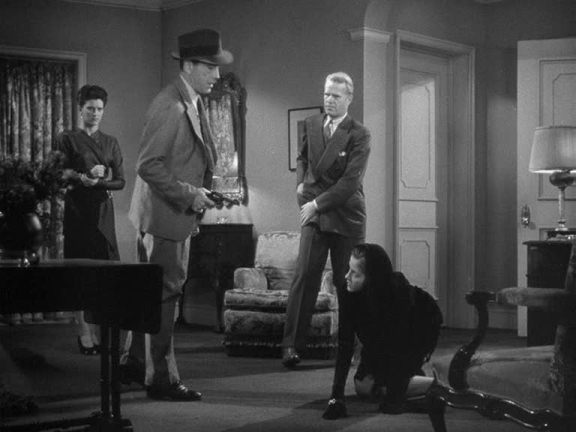
.
Marlowe soon strides with characteristic directness into the thicket of double-crosses Geiger’s death causes amidst his coterie of associates, including reputed creep Joe Brody (Louis Jean Heydt), who may or may not have killed Taylor for Carmen’s porn pictures, but who’s certainly trying to squeeze the Sternwoods again with them, with Agnes as grouchy confidant and Lundgren gunning for whoever he thinks killed Geiger. Events and personalities collide in Brody’s apartment in a hilarious and then brutal critical mass that sees Marlowe sarcastically outwitting not just Brody but also Vivian, who tries to cut a separate deal, and then Carmen, who turns up wielding a pistol to collect her photos. Many directors might have let this sequence devolve into an extended exposition punctuated by random, gun-wielding interlopers. Hawks turns it into a bedroom farce, linked to the screwball comedies he helmed in the 1930s and would direct again in the near future, except with blackmail and murder added to sex. Marlowe casually calls out Agnes and Vivian out from the curtain behind which they are hiding, with Marlowe and Vivian’s frenetic argument interrupted by an exasperated Brody.
.
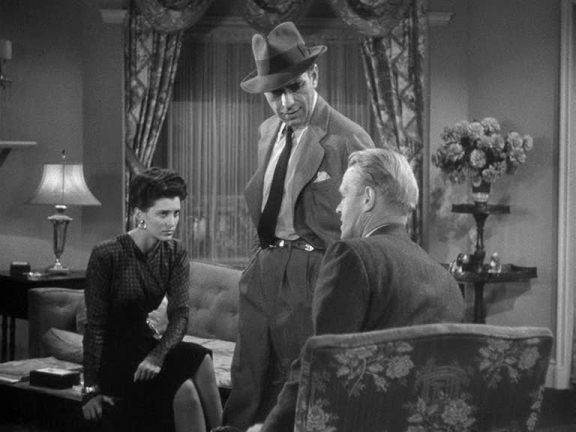
.
Later, in a subtle, but brilliant encapsulation of Hawks’ technique, Marlowe, now holding the gun and the aces, grills Brody over his actions before Taylor’s death. Brody sits in a chair and Marlowe prowls on the far side facing the camera. Brody shifts his position as he explains, trying to avoid Marlowe’s excoriating gaze, and the camera pans slightly back and forth, tracing this little dance of power, with Brody quite literally shifty, Agnes looking on poised like a praying mantis dying to chew Brody’s head off, and Marlowe’s potency visually stated. A moment like Marlowe kicking Lundgren in the chin after challenging him to pick up a gun only confirms his mastery, a spasm of physical violence as precise and immediate as any kung-fu battle and quicker to the point. Of course, Marlowe was also himself perhaps the most knocked-out and beaten-up hero in the history of literature, and here he gets the crap knocked out of him by a couple of stand-over artists and his lights turned off by a thug with a fist full of pennies. The Big Sleep is set in wartime, instead of being a quasi-period piece, an off-hand detail confirmed by the rationing stickers on the cars and the habit of chief villain Eddie Mars (John Ridgely) referring to Marlowe as “Soldier”—which he is, lone warrior keeping the home front in order.
.
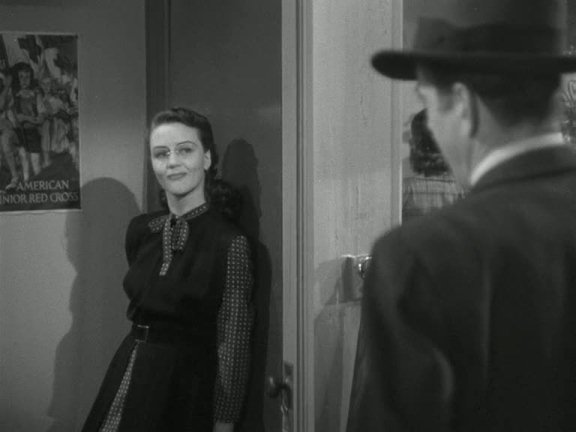
.
One fascinating aspect of The Big Sleep is that as an action film made during World War II, the age of Rosie the Riveter, Hawks is in a wonderland where his love of gender blurring can be given free rein, free from the usual justifications for having the classic Hawksian lady on hand, as female taxi drivers who can flirt hot and drive cool could be introduced without comment. Marlowe has starkly memorable interactions not just with appointed love interest Vivian but with a complement of strong vivid, hardboiled gals of various persuasions, from Agnes to Carmen, to cute librarians, cigarette girls, gangland wives, and, most deliciously, Malone’s embodiment of an everyday wet dream, the trimly bespectacled geek girl who archly transforms into drop-dead babe for a bout of backroom sex between incidents in the case. Malone’s star was as instantaneously sealed by her appearance here as Bacall’s was giving whistling instructions in To Have and Have Not. Vickers is similarly marvellous as the protean Carmen, swerving from frightened kid to coquettish seducer to wrathful dope freak, and yet, amazingly, her career never went anywhere after this. This was also true of Darrin, who’s brilliantly spiky as Agnes (“Whadda those look like, grapefruit?”), the proverbial cookie full of arsenic.
.
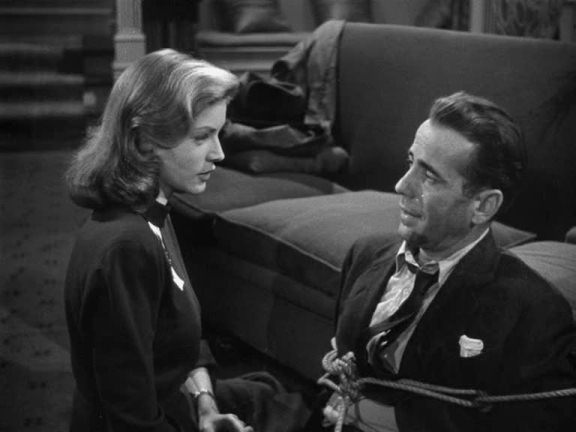
.
No director of his—or perhaps any—era had such finite understanding as Hawks of the film actor as a lodestone of both singular personality and ensemble reaction, and how to use this to enrich rather than take over a film, especially when it came to the ever-mercurial nature of sex appeal. In Bogie and Bacall’s combusting on-set romance he had a force of nature at his disposal, and yet The Big Sleep had to be retooled to make the most of it to ease studio worries over Bacall’s less well-received sophomore work in The Confidential Agent (1945). So, scenes were added sporting charged conversations where the couple assess each other’s sexual style through horse racing metaphors, and a late scene is laced with intimations of S&M as Vivian voraciously kisses a trussed and bloodied Marlowe. The whole thing adds up to one of the sexiest films ever made, a rare achievement not just considering the time of its making but also its usually more businesslike, overtly macho genre. Part and parcel, too, of the film’s greatness is the almost relentless stream of great dialogue provided by the awesome trio of screenwriters, with Jules Furthman rounding out the work by Faulkner and Leigh Brackett. Speech in The Big Sleep is not, however, just a series of verbal displays of cleverness like too much modern film and TV writing. It’s given form and shape by the niceties of streetwise communication, and usually predicated on characters testing each other, feeling out motives, fishing for revelations, toughness made apparent not just in slugging and shooting, but also in verbal wit and dexterity and their capacity to hold onto knowledge, another form of power. The General’s aged, ruined form (“I seem to exist mostly on heat, like a newborn spider”) conceals a man who has no need to ration truth, which puts him at an advantage over just about everyone else, but also signals how far out of the running he is now.
.
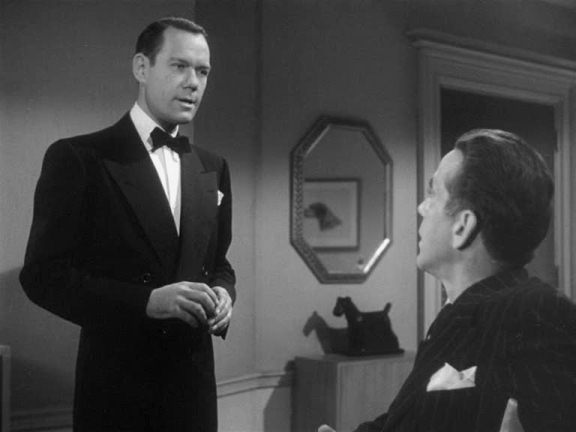
.
Verbal currency is certainly at stake during Marlowe’s first conversation with Vivian, where she tries to wheedle facts out of him, but is instead provoked to quick displays of anger. Bogart’s Marlowe turns his weaknesses into strengths through his verbal nimbleness. “So you’re a private detective,” Vivian greets him, “I didn’t know they existed except in books or else they were greasy little men snooping around hotel corridors. My, you are a mess, aren’t you?” An opening barrage many could not recover from, but Marlowe replies, undaunted, “I’m not very tall either. Next time I’ll come on stilts, wear a white tie and carry a tennis racket.” There’s a pair of clever in-jokes lodged in this line, as Bogart had been forced to wear platform shoes opposite Ingrid Bergman on Casablanca (1943) and had often ridiculed his early career playing Joe College types who say “Anyone for tennis?” Marlowe’s quip deprecates both himself and the actor playing him, but in a way that gives both stature and potency. Similarly knowing are Marlowe’s exchanges with Carmen, where he calls himself Doghouse Reilly in parody of stock tough-guy shtick, the filmmakers wise to Chandler’s strategy of kidding the genre’s clichés just a little to clear ground for his own. By comparison, Marlowe’s interactions with Mars see two alpha males assessing each other’s qualities almost delicately, though even Mars is finally driven to note irritably, “You take chances Marlowe.” “I get paid to,” the private eye replies. Ridgley’s performance is nicely understated, never trying to come on like the tough guy.
.
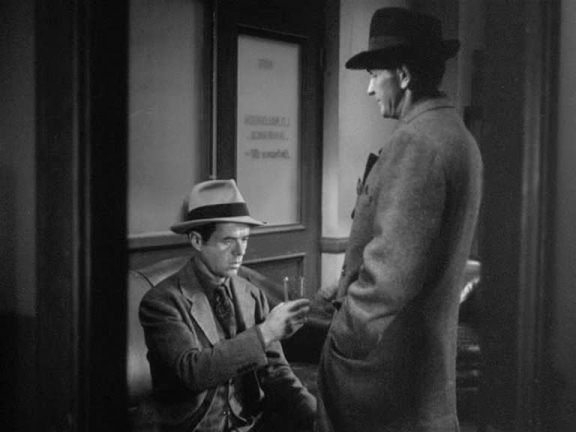
.
Mars is a gambling boss who proves to be shepherding the Sternwoods’ darkest secrets even as his associates, like Geiger, try to profit from them. Even when the case seems over, with the Sternwoods’ blackmailers dead or locked away, Marlowe comprehends that some deeper game is being played, especially when Vivian is apparently robbed by one of Mars’ goons after a big roulette win. Marlowe realises the robbery has been staged, and is seemingly connected to the disappearance of Mars’ wife, who supposedly ran off with Sean Regan. Marlowe cops a beating for his continued interest, but then encounters Harry Jones (Elisha Cook Jr.), Agnes’s diminutive but poised boyfriend, who offers to sell interesting information. Before Marlowe can pay him off, he witnesses a unique bit of cruelty, as he spies on Mars’ main thug Canino (Bob Steele) extracting Agnes’ whereabouts from Harry, who’s loyal enough to lie, and then bullying him into drinking poison. Even for Marlowe, it’s so nasty and depressing a spectacle that he spends the rest of the film restraining a glimmering ferocity that finds equal expression in forcing Mars’ wife Mona (Peggy Knudsen) to recognise the monster her husband is. Marlowe finds Mona with the help of Agnes, whose words of regret for Harry’s death are, “I got a raw deal.” Agnes puts Marlowe onto the actual whereabouts of Mars’ wife, and he arrives at a rundown service station where a kick on the door brings out the gun-wielding, nerveless owner Huck (Trevor Bardette) and, more portentously, Canino, solicitously inviting Marlowe in to make an easier catch.
.
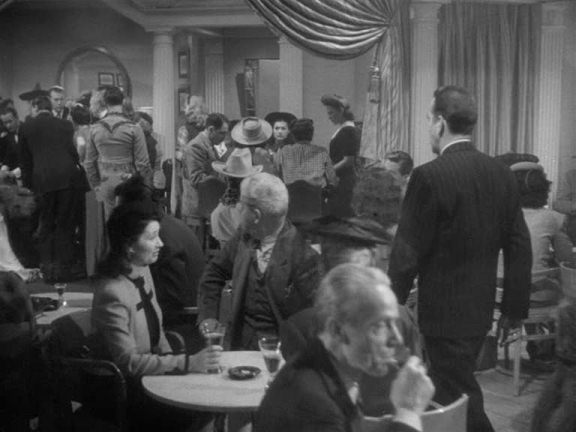
.
Hawks’ classical, spacious mise-en-scene is at its most open and free-flowing through The Big Sleep. Cuts only come when necessary, as Hawks generally prefers to choose camera set-ups that allow for nimble shifts of focus. His camera drifts with and amidst characters in settings like the Sternwoods’ mansion and Mars’ gambling palace, where geography is at once carefully unified and hard to read, camera peering through into adjoining rooms and the sense of secret forces always at work, a notion confirmed when Mars offers to let Marlowe see the rooms behind the gambling tables. Marlowe replies, “No thanks, I’ll go out with the rest of the suckers.” Hawks avoids the more expressionistic edge of noir for the most part except for odd moments, as when Marlowe eavesdrops on Jones’ death, the silhouetted victim and villain seen through glass with the camera deftly taking up a position where it can see Canino through a gap in the door, privileging the viewer. Yet the frames are often flooded with darkness, the lighting a careful alternation of dark zones and hazily embracing lights.
.
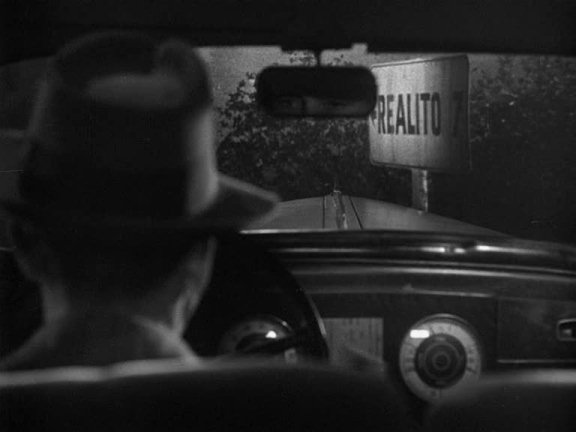
.
The camera quite often becomes the observant eye that Marlowe is, reading promissory notes, car registration slips, street signs, or spying on a stick-up going down. Such are the readily absorbable details of the modern world, the signs and wonders Marlowe’s understanding depends upon, but, of course, nothing compared to reading people, like Vivian’s insolent mandarin visage when Marlowe first sees her. Praising any single performance in The Big Sleep feels pointless because of the general excellence, the machine-tooled refinement of the actors’ rhythms, which make the film seem to work like a racing engine, fast and efficient and utterly integral. Hawks’ beloved, rapid-fire, overlapping dialogue patterns turn all that great dialogue into an aural dance of precise musical intensity.
.
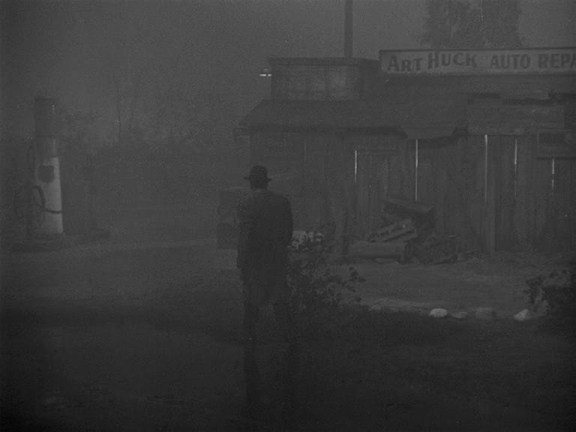
.
The typically cheap Warner Bros. sets, swathed in mist and rain (more rain falls in the course of the film probably than in the average L.A. year), nonetheless imbue the film with its pervasive air of enclosing gloom, and even when Marlowe heads out of town the landscape offers no respite. Even a moment of overt slapstick to relieve the mood—Huck running for the hills at a shot from Marlowe—is still rendered as a moment of hysterical energy, particularly thanks to Max Steiner’s scoring. In spite of its nominal pretences as an account of the very real dangers and depths of American society and idealised vision of the battle against them, some perhaps well known to members of the cast and crew, The Big Sleep, as its weird, pithily poetic title suggests, is far from realistic. It is indeed one of the most fervently delirious works from classic Hollywood, moreso than John Huston’s adaptation of Hammett’s most stylised creations in The Maltese Falcon (1941). This is a world of golems lurking in the shadows (Canino), lesser imps and demons (Brody and Lundgren), capricious witches (Agnes and Carmen), royal priestesses (Vivian), ruined kings (Sternwood), and thieving pretenders (Mars), with Marlowe as muddied knight-errant. The tale occurs in a zone of the fantastic, a grotesque netherworld where every character is harbinger of either sex or death.
.
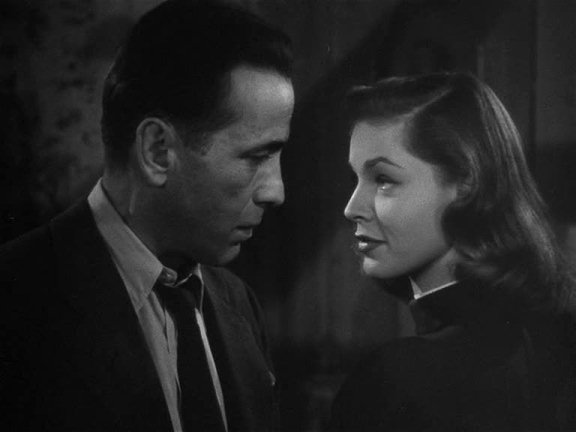
.
The evolving relationship of Marlowe and Vivian, who turns out to be hiding with Mona in a last-ditch effort to put Marlowe off the scent, pays off naturally as she not only frees him, but proves gutsy and loyal enough to help him trick Canino. Canino finishes up on his back with a gut full of bullets, and Marlowe sets out to entrap his boss. In the book, it was revealed that Carmen shot Regan in a moment of druggy, jealous anger when he rejected her advances, and that Mars has both covered up the crime but used it as a way to siphon the Sternwood fortune. Here that’s passed over and inferred in favour of a fiendishly nasty climax (one Hawks would later recycle in 1966’s El Dorado) that sees a casual aside earlier in the film, Mars’ invitation for Marlowe to step outside when his goons are patrolling, turned into a trap. Marlowe drives the criminal out of Geiger’s house so that his own thugs machine-gun him down, his fate traced out with ghoulishly memorable concision by a line of bullet holes erupting through a door before his limp and perforated body falls back. Hawks fades out on the sound of police sirens as Marlowe and Vivian face each other in a moment of triumph, but before their besiegement actually ends, poised between past and future, with the pure moment of anticipation now theirs—the immediate prospect that at last someone’s going to get laid. However you view it, The Big Sleep is one of the classics that define classic Hollywood.

I’d heard before seeing The Big Sleep that it was muddled and confusing, and that’s true I guess. I agree with you that it isn’t really the point, however. I love the dialogue and the way that Hawks creates the “atmosphere of impeccable sleaze” as you put it. Even though it sidesteps a lot of the plot, you can still sense what’s happening because of the tone. I found this a lot more enjoyable than The Maltese Falcon, which is great but doesn’t have the same fun with the genre.
LikeLike
Well “fun” is a bit of an awkward proposition in this regard because The Maltese Falcon is sublimely entertaining but it’s self-contained and quite serious whereas this at points feels at times like a self-conscious riff on the genre and a celebration of its actors’ chemistry over and above its plot mission statement. Spade and O’Shaughenessey’s romance doesn’t charm you like Marlowe and Vivian’s does; it’s actually rather pathological. The differences in the two films says much about the differences in the two filmmakers handling them and about the men who wrote them. I’ve never found the plot so opaque; certainly the way Hawks, Faulkner, Brackett and Furthman tweaked the story made it entirely possible for Brody to have killed Taylor, and the other elements make sense enough. But as you say, it doesn’t matter that much. It’s like an immersion in a world of evil and you enjoy seeing Marlowe cut his way out.
LikeLike
I think Faulkner’s Southern sensibility is a key ingredient in this film. It reminds me strongly of Tennessee Williams and “Camino Real” or of Baby Doll, with the latter’s evocation of sex the purpose of everything else going on.
LikeLike
Hmmm. You might have a point there, although a lot of the sex-as-prime-motivator is in the novel and it’s so strong in Hawks’ films too. Happy coincidence of artistic interests perhaps. Of course, Faulkner would’ve been right at home with the twisted dynasty dynamics of the Sternwoods.
LikeLike
I have always loved the movie, but your review makes me want to read the book.
LikeLike
The book is cool, Andrew, and anything that does encourage reading the novels is all right by me. Although The Little Sister is my favourite Chandler by a fair margin.
LikeLike
There ought to be an award for writers who know the correct use of ‘gunsel’.
LikeLike
You’re damn right.
LikeLike
I had to tell Leigh (bdswagger) the meaning of gunsel in “The Maltese Falcon.” She didn’t believe me. Supposedly the alternate sense of “gunman” comes from the novel. It sure didn’t mean it before that.
“The Maltese Falcon” is my favorite movie (unless Dekalog is counted as a ten hour movie). And it has Mary Astor to remind us no movie is perfect. As far as Marlowe films go, I like “Murder, My Sweet” better because Dick Powell is fun (though not Chandler’s idea of Philip Marlowe) and it has a plot that makes a lot more sense. (I go with suicide for the chauffeur’s murder. He hired a hit man to get him into another movie.)
My favorite character in “The Big Sleep” is played by Dorothy Malone. I keep hoping the writers will find an excuse to have her in more scenes.
LikeLike
Thanks for brining out so many great background details about a film I love. I blazed thru Chandler and Hammett while I was a kid, and I very much appreciate the care taken in The Big Sleep to capture the tone.
I’ll take moviemaking like this over just about anything made nowadays.
LikeLike
What a great analysis of one of my favorite films! (And author; and actor).
This is a book and film that directly defined a large portion of my professional life. I started out as an academic (philosopher, Joyce scholar), became a dot-com guy (and then an unemployed dot-com guy) and then a Private Investigator… I was living on internet money, on a beach north of Boston, when a friend-of-a-friend offered me a job – I was intrigued, given my love for Hammett and Chandler and one thing led to another.
I re-read Chandler and Hammett four or five years into my stint as a PI and was pleasantly surprised by the distinctions between Spade and Marlowe. Don’t get me wrong: I love Chandler for his prose, amongst other reasons, but it was clear that Dash had actually worked the job. Little details, mainly… I found it very interesting that, 70 or 80 years’ later, we still work cases in much the same fashion (albeit with some technological enhancements).
My favorite line from the book is when Marlowe first meets Sternwood in the greenhouse: “the stalks of the orchids were like the freshly washed fingers of dead men.”
Best, Chris.
LikeLike
Syd: I have nothing against Astor in The Maltese Falcon except her hairdo. Otherwise she’s terrific. As for Malone’s character here, I found in revisiting that vignette from the book how cleverly the filmmakers took her and small arsenal of good lines and built it up into something memorable. Novel Marlowe swaps a few quips with her including that “You’d make a good cop” line; film Marlowe is more malleable in his work dedication. Myself, I don’t like Murder My Sweet that much. Powell was good but the story was too screwed about with and Claire Trevor didn’t work as a femme fatale.
Roscoe: Certainly if one wants to escape the bitterer flavours of contemporary culture, this is a good bet.
Chris: What a damn fascinating story you have to tell and thanks for sharing it with us. And yes, Hammett and Chandler are definitely quite distinguishable as talents. Chandler’s prose was the stuff of dreams (your quote is a great example) but I would also agree that in the long run Hammett had the edge, as a writer who put his life experience into his art and compressed it into diamonds. The phraseology in Red Harvest is powerful and chilling precisely because it’s so minimalist. Chandler painted in Dali’s oil colours, Hammett etched with fine chisels.
LikeLike
“Chandler painted in Dali’s oil colours, Hammett etched with fine chisels.”
What a fine distinction and so eloquently put!
As a former Joyce guy and poet (at one point) I tend to collect – and recollect – bits of prosody…
Malcolm Lowry anyone? “Over the town, through the dark tempestuous night, backwards revolved the luminous wheel.”
Fantastic stuff.
LikeLike
First saw this in 1945. Just a Lower East Side Manhattan kid. All these folks seemed to inhabit a “world” just beyond my ken: “a world such as dreams are made of.” Seventy-five years later, despite ” extra-diegetic, intra-diegetic or just plain diegetic structural vocabulary at hand, I find less academic “jargon” less than satisfactory for a “décortisation” of this filmic dreamscape, I just wonder what the “apport” of Leigh Brackett might have had in the narrative? I see traces of the Fisher King’s wound, the “intergalactic” vehicles propelled from world to world some what anticipatory of Ms. Bracketts, much later Starwars cosmos.
LikeLike
“I see traces of the Fisher King’s wound, the “intergalactic” vehicles propelled from world to world some what anticipatory of Ms. Bracketts, much later Starwars cosmos.”
Marvellous, John, just marvellous. Also, ties in with my notes on how the narrative works on a level of mythology, again echoes Star Wars.
LikeLike
Springing from Marie de France’s Anglo-Norman “Lais” I see much and more of the Wounded Fisher-King in this Noir. Perhaps the name of the old gent: Sternwood is hinting at genital mutilation? The two “incapacitated” daughters: one a thumb sucking nymphomaniac and the other a husband shucking standalone. No progeny there! The later “horse metaphored” ditty, sung at a gallop across a “louche” domain is UrNoir
There is much more: “L’éternel retour” wartime trope, from across the channel springs to mind. But, like the General Old age (83) has me in its thrall and so Itake leave for the nonce.
LikeLike